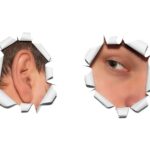Audio vs. Video – Listen to Feel or Look to See by Pat Rullo

As a radio host, the success of my shows depends heavily on my ability to quickly establish a rapport with my guests. More than just easing their nerves, creating an intimate connection gives the guest a professional interview they feel proud to share and allows listeners to become a part of that connection.
Regarding interviews, there are four primary formats to choose from; in-person, written, audio, and video. An in-person interview is seldom a viable option, and written interviews are kind of boring. While video interviews have become increasingly popular in recent years, audio interviews still hold a special place in the hearts of many. For me, audio interviews are more intimate than video interviews, which initially seems counterintuitive. But having cut my teeth at terrestrial radio stations, maybe I’m old-school? Think about the days when we listened to baseball games on the radio. We relied on the announcer to fill us with the sounds, smells, and excitement we could only imagine. Not only did we feel as if we were sitting in the bleachers, but we also had an intimate relationship with the announcer, if only for a few hours.
What do I mean by intimate? Intimacy refers to the feeling of closeness, familiarity, and connectedness we feel with the host. When it comes to one-on-one interviews, it allows for moments of vulnerability and honesty as the guest feels comfortable opening up. While this can certainly be achieved in a video interview, there are a few reasons why audio interviews may be better suited to creating this level of intimacy.
Guests may feel self-conscious or scrutinized when being interviewed on camera, as they know everything they do or say is being recorded. This can create a sense of pressure that is absent in an audio interview. Without the added visual element, they can focus solely on their words and ideas without worrying about their appearance or body language. Hair, makeup, clothing, background – these are externals that we often control to create an illusion. This shift in focus away from the worry of how do I look – can lead to deeper introspection and reflection, as they can delve into their thoughts and emotions without distraction.
And speaking of distraction – as a listener, I find that video is highly distracting. I spend much time analyzing the crooked pictures on the wall behind the guest, the magnets and papers on their refrigerator, or the Zoom beach scene behind them. No longer do I listen to feel; I look to see. It’s like reading a really good book and then watching the movie. Your initial mental images driven by the book’s words are gone.
Another reason why audio interviews can be more intimate is that they evoke different senses. Hearing someone’s voice allows us to pick up on nuances and inflections we may not notice when watching them on screen. In addition, the tone and timbre of someone’s voice can convey a wealth of information about their emotions and personality, creating a more nuanced and multi-dimensional portrait of them. In this way, audio interviews offer a more holistic understanding of the person being interviewed. This allows the listener to connect with them on a deeper level. These subtle details can provide a solid emotional connection between the speaker and the listener, creating a more immersive experience.
Lastly, audio interviews offer a slower and more thoughtful pace. There is often a sense of rush with video interviews, as the host and guest may feel pressured to fill the silence with movement or conversation. In contrast, audio interviews tend to be more deliberate and measured, as there is no visual distraction to fill the gaps. This slower pace allows for more meaningful moments of reflection, giving guests the space to articulate their thoughts and feelings fully while creating a sense of intimacy for the listener through the moments of silence and reflection.
I know some may disagree, and again I say that perhaps my training and work experiences at traditional radio stations color my thoughts. I love radio, and I enjoy learning about my guests through the simple yet intimate power of their words.
PR
